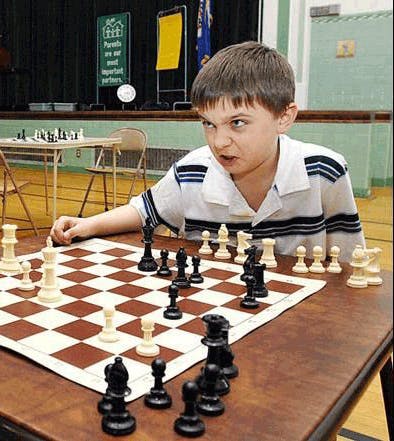Are you sure you want to delete your account?
(This will permanently delete all of your data - purchases, game scores, ratings, etc)
Change your username
Your current username is: guest
Change your account email address
Your current account email is:
Redeem your Fampay code here!
Use your Fampay code to get access to the Play Magnus Plus Membership!

Dealing with Anger During a Chess Tournament
Fear is the path to the Dark Side. Fear leads to anger. Anger leads to hate. Hate leads to suffering.
Yoda
Let’s continue discussing practical chess psychology. Negative feelings are detrimental to your chess performance. A typical example of such an emotion is anger. Even as Black, you don’t want to fall to the Dark Side!
I will present to you a situation from my past. Read it carefully, please, and think about what I should have done differently.
When I was in my early 20s, I visited my parents and decided to play a chess tournament in my local city. As I was leaving for one of the rounds, my father started mocking my outfit, an elegant sports suit – the official apparel of the Russian sports team, and recommending me to put on “something more appropriate.” By doing that, he sounded rather rude and patronizing. I snapped back at him, pointing out that he had no idea what he was talking about and that it was my business anyway. I left home feeling quite frustrated, mainly since, instead of offering me a few simple words of moral support before the game, my father managed to tilt me.
That day I was Black against a player rated over 500 points below me. The game was supposed to be a walk in the park, so I was still dwelling on what happened between my father and me when I sat down at the board. We started blitzing the opening moves out. Feeling irritated and knowing that my opponent was supposed to be a patzer, I kept the tempo and reacted at lightning speed. Then, suddenly, I fell for an opening trap and got checkmated on the board! Overall, I performed reasonably well in the event, while my opponent finished in clear last place, winning only one game – against me, one of the rating favorites.
Now that you have given this situation some thought let’s compare our conclusions. They don’t necessarily have to be identical; maybe you will come up with fantastic suggestions that didn’t cross my mind.
Tip 1. Try to avoid all sorts of unsolicited distractions during tournaments. It’s hard to combine playing tournaments with other activities, so try to make sure that your boss won’t message you at the critical moment or that your friends won’t be asking you out, etc. When it comes to top players, even when they compete in their home city, they usually stay at a hotel where the atmosphere is more professional and chess-oriented. In contrast, your family will probably not take your tournament seriously enough and keep demanding attention from you at home. In my case, by staying at my parents’ place, I took a risk and suffered the consequences.
Tip 2. Relax, take it easy. When we look back at some of the events in our life, we realize that their significance was grossly overestimated back then. For example, in the situation of an argument with my father, I should have probably realized that he meant no harm. Instead of engaging in a heated discussion with him and feeling frustrated, I could have made a joke and resolved the situation peacefully. After the round, I could have explained to him in a friendly way that I would rather not be unsettled like that when playing an event.
Tip 3. Adopt certain rituals that will help you calm down if needed. More on that later.
Tip 4. Don’t underestimate your opponent regardless of his rating. If he plays very fast, you don’t have to “accept the challenge” and act likewise. In fact, you are giving him odds by following suit instead of thinking carefully about how to react optimally.
Let’s move on to the situation I had recently and see whether I learned my lessons or not.
I was playing an open tournament in a different city. After preparing for the round, I started talking to my significant other on WhatsApp, giving her some attention and hoping to be in a good mood for the game. Alas, for us, we ended up having a tough discussion about our relationship. There were no heated arguments or accusations, but after the talk, I felt betrayed, upset, and angry with myself, her, and the way life works in general. On top of that, the tournament wasn’t going my way, so I recalled the situation with my father and thought: Am I really going to lose terribly today as I did back then? If such things creep into your mind, you are already at serious risk of failure.
What I just described is a common situation in life. Think about how you would handle it, and then let’s compare our opinions.
Here is how I tried to mitigate the damage step by step.
First of all, I bailed out from the discussion as soon as I realized that it was starting to get ugly. Even though we had a disagreement, I reminded myself that I love her and don’t want to hurt her feelings. Being aware of having a problem is key to dealing with it successfully.
Secondly, keeping the anger to yourself destroys you from inside. I am not the kind of guy who likes punching bags or yelling (which may work well for some people), but I do like talking. In such situations, you can call your psychologist (if you have one) or a very close friend you trust and speak what’s on your mind. However, if you don’t have such people available for you or would prefer not to bother them with your problems/share intimate thoughts, you can always record your voice and listen to it. This way, you can stay emotionally detached from the situation as if it were not you, but some stranger was complaining about things. In my case, I sent a voice message to my best friend, briefly commenting on the fact that I was worried about not being in top shape for the round due to this and that. I felt instant relief after doing it.
Thirdly, I changed my focus. I left my suite earlier than usual and went for a short walk, admiring the local scenery instead of rushing to the playing hall on autopilot while pondering what I should have done differently in the conversation. It turned out that the sun was still shining and that life goes on no matter what happens!
Fourthly, after winning the fighting game and coming back, I used the “anger letter” technique that I picked up from Mark Twain. When you are seriously pissed about something and overreacting, you can write down all your thoughts in a letter, releasing your anger. You don’t even have to send it; one of the options is to burn it, thus letting go of negative feelings. I jotted a few lines in my diary about this accident but didn’t show them to anyone. Instead, in the evening, I reminded my significant other that chess tournaments are vital for me, so it would be great if she didn’t drive me mad before the rounds. Still, I should have probably voiced my ideas smoother and emphasized that I would appreciate her support a lot.
The way the conversation proceeded, even though it was polite and reserved, I believe she took it more like “leave me alone so I can play well” and acted accordingly until the end of the event. Still, having no moral support is better than having someone sap mental energy from you during a tournament.
Finally, I was expecting her to be up to date on such matters since she is a Woman Grandmaster and knows all the ins and outs of a chess player’s lifestyle. In contrast, it is much harder to explain to someone not interested in chess why they should treat you carefully while you are playing. If needed, discuss it in advance with the people in question and make sure they understand your reasoning. Look for a compromise.
The second example also encourages one to review his priorities in general. For instance, I can see that some people may argue that chess tournaments are not particularly important as compared to your relations with others. Maybe in such cases, chess should be neglected, and all your efforts should be spent on resolving the conflict between you. There is no “right” or “wrong” answer here; you should know yourself and act consciously according to your principles. Still, I hope this short post will offer you some food for thought and help decide how you will be handling anger during a chess event.

